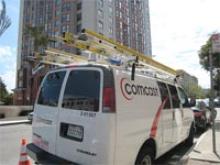Lafayette Offers 100Mbps Residential Tier ... And Ruminations on Bandwidth Caps
Lafayette's LUS Fiber network, after recently kicking off its ad campaign, has decided to offer 100Mbps residential connections after a number of requests from subscribers. The network previously offered a 100Mbps business service for $200 -- it seems they are now just allowing anyone to subscribe at that level and price.
As John notes at Lafayette Pro Fiber blog, this is the only tier for which residential plans come with the same price as business plans.
 This brings up something I don't think I previously noted in discussions about LUS Fiber - it comes with a monthly transfer cap. I cut the cap chart out of their user agreement [pdf] above. Remember, 8 bits to the byte. Thanks to DSL Reports for the link to the user agreement.
This raises an interesting discussion. Private cable companies typically enforce caps because their network cannot physically support many users using a lot of bandwidth simultaneously. When hundreds of users share a single connection (as with cable), a few major users can seriously impact the experiences of others.
In a FTTH network like Lafayette's, there is no real danger of one user's activities affecting another's. However, there is a danger of racking up a high bandwidth charge for LUS Fiber if many users are constantly using a lot of bandwidth.
This brings up something I don't think I previously noted in discussions about LUS Fiber - it comes with a monthly transfer cap. I cut the cap chart out of their user agreement [pdf] above. Remember, 8 bits to the byte. Thanks to DSL Reports for the link to the user agreement.
This raises an interesting discussion. Private cable companies typically enforce caps because their network cannot physically support many users using a lot of bandwidth simultaneously. When hundreds of users share a single connection (as with cable), a few major users can seriously impact the experiences of others.
In a FTTH network like Lafayette's, there is no real danger of one user's activities affecting another's. However, there is a danger of racking up a high bandwidth charge for LUS Fiber if many users are constantly using a lot of bandwidth.
The other residential tiers are cheaper than their corresponding business tiers by 45-48%. Nor, according to Huval's remarks in the comments is the monthly usage cap any different—in both the residential and the commercial versions of the 100 meg package is capped at 8 terabits. (Note: that'd be about 1 terabyte of hard disk storage.) The idea behind the higher prices for businesses is that they use much more bandwidth than households—and LUS pays for its connectivity by capacity.
 This brings up something I don't think I previously noted in discussions about LUS Fiber - it comes with a monthly transfer cap. I cut the cap chart out of their user agreement [pdf] above. Remember, 8 bits to the byte. Thanks to DSL Reports for the link to the user agreement.
This raises an interesting discussion. Private cable companies typically enforce caps because their network cannot physically support many users using a lot of bandwidth simultaneously. When hundreds of users share a single connection (as with cable), a few major users can seriously impact the experiences of others.
In a FTTH network like Lafayette's, there is no real danger of one user's activities affecting another's. However, there is a danger of racking up a high bandwidth charge for LUS Fiber if many users are constantly using a lot of bandwidth.
This brings up something I don't think I previously noted in discussions about LUS Fiber - it comes with a monthly transfer cap. I cut the cap chart out of their user agreement [pdf] above. Remember, 8 bits to the byte. Thanks to DSL Reports for the link to the user agreement.
This raises an interesting discussion. Private cable companies typically enforce caps because their network cannot physically support many users using a lot of bandwidth simultaneously. When hundreds of users share a single connection (as with cable), a few major users can seriously impact the experiences of others.
In a FTTH network like Lafayette's, there is no real danger of one user's activities affecting another's. However, there is a danger of racking up a high bandwidth charge for LUS Fiber if many users are constantly using a lot of bandwidth.


